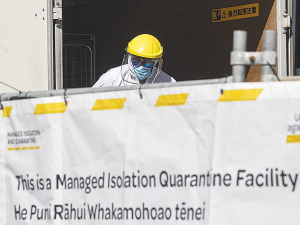Chris Lewis ready for another term
After serving three as a DairyNZ director, Waikato farmer Chris Lewis is ready for another term.
 A lack of spots in MIQ have become a barrier for getting international dairy workers into New Zealand.
A lack of spots in MIQ have become a barrier for getting international dairy workers into New Zealand.
Securing MIQ spots remain the biggest hurdle to getting overseas workers for the dairy sector.
Five months after the Government granted border exceptions for 200 dairy farm workers and their families, just a handful of workers have arrived in the country.
Now in the dairy sector is pleading for 1500 overseas workers to be allowed into the country and self-quarantine on farms before the start of 2022 season to ease a severe staff shortage.
Federated Farmers dairy chair Chris Lewis says a lot of behind-the-scenes work is going with the Government.
He told Rural News that the Ministry for Primary Industries (MPI) and Agriculture Minister Damien O'Connor's office has asked for more information.
"Everyone is working hard behind the scenes on this," he says. "We have researchers working on our behalf to get additional information. It's a massive effort."
Lewis says while MPI and O'Connor are working closely with the dairy sector, the biggest hurdle is securing MIQ spots for overseas workers.
He points out that only two or three workers have arrived into the country so far - despite the Government granting border exceptions five months ago for 200 dairy farm workers and their families, comprising 150 herd managers or assistant farm managers and 50 farm assistants.
"Without securing MIQ spots, it is bloody hard."
Lewis says it's hard to say how many workers will be here by the start of the next season.
But he points out that with the rapidly changing position, New Zealand's border could be open by then and the request for 1500 special visas would become obsolete.
Earlier this month, DairyNZ, Federated Farmers and Dairy Women's Network urged the Government to allow 1500 international dairy workers into New Zealand in 2022 to help meet the sector's workforce shortfall, if borders continue to remain closed.
Along with the request for additional international workers, the organisations also support international farm workers being able to quarantine in separate housing on-farm, if fully vaccinated and following Covid-19 safety requirements while in quarantine.
Recent weather events in the Bay of Plenty, Gisborne/Tairawhiti, and Canterbury have been declared a medium-scale adverse event.
DairyNZ's chief executive Campbell Parker says the 2024/25 dairy season reinforces the importance of the dairy sector to New Zealand.
A New Zealand agribusiness helping to turn a long-standing animal welfare and waste issue into a high-value protein stream has won the Australian dairy sector's top innovator award.
OPINION: A bumper season all around.
Dairy Women's Network (DWN) has announced that Taranaki dairy farmer Nicola Bryant will join its Trust Board as an Associate Trustee.
Rural Women New Zealand (RWNZ) says it welcomes the release of a new report into pay equity.